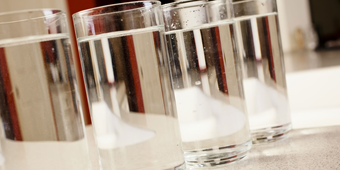Can I Have a Drink? Alcohol and Your Diabetes

Answer a few questions and we'll provide you with a list of primary care providers that best fit your needs.
If you have diabetes, you know it’s important to take special care with your diet. With that in mind, you may have assumed that drinking alcohol is a no-no. But that’s not necessarily the case.
It may be all right for you to have a drink now and then. It depends on several important factors, including how well under control your diabetes is, your understanding of how alcohol affects your blood sugar, and the advice of your health care team.
What Does Alcohol Do to My Blood Sugar?
An important part of your liver’s job is to make glucose (sugar) and send it into your bloodstream, where it helps to prevent a low blood sugar reaction. Alcohol can disrupt this routine liver function. The alcohol you drink must be broken down by the liver, and that process can interfere with the release of sugar into the blood, causing your blood sugar to drop, especially if you are drinking on an empty stomach or just after exercising.
Drinking alcohol also has the potential to raise your blood sugar, since many alcoholic beverages contain carbohydrates, which can quickly increase your blood sugar.
Drinking can affect your blood sugar in another way: Alcohol is high in calories and can also make you hungrier than usual, so you may be more likely to overeat while drinking — which can affect your blood sugar, in the short run, and your weight, in the long run.
Given the effects of alcohol on blood sugar, if you have diabetes, you’ll need to approach alcohol more carefully than do your friends who don’t have diabetes.
What’s the Safe Way to Drink?

Given the effects of alcohol on blood sugar, if you have diabetes, you’ll need to approach alcohol more carefully than do your friends who don’t have diabetes.
- First, follow your doctor’s advice about drinking and your diabetes. If he or she determines that it is OK for you to drink alcoholic beverages, ask for clear guidelines, and follow them strictly.
- Know the American Diabetes Association (ADA) guidelines for drinking. The ADA recommends that women with diabetes limit themselves to no more than one drink a day, and men no more than two drinks a day. (One drink means one 12-ounce beer, 5 ounces of wine, or 1.5 ounces of hard liquor.)
- Know your blood sugar level. Check it before you drink, and if it’s too high or too low, don’t drink. Check your blood sugar after drinking, too, and before you go to bed. Alcohol can affect your blood sugar for up to 12 hours, and if it’s dropping, you may need a snack or glucose tablet.
- Be aware that the effects of low blood sugar can mimic the effects of alcohol. Make sure your friends know you have diabetes and that the signs of low blood sugar can sometimes appear like drunkenness. Let them know how to help you in case there’s a problem, and always wear a medical ID bracelet.
- Never drink on an empty stomach or when you know your blood sugar is out of the safe range. Always eat a meal or a snack when you drink.
- Don’t drink while you’re exercising or immediately afterward — exercise lowers your blood sugar.
- Don’t drink and drive.
Are Some Alcoholic Drinks Wiser Choices Than Others?
It’s helpful to remember that the calories in alcohol are empty calories. Alcohol has very little nutritional value, and once it’s broken down by the liver, it turns into fat!
Here are a few more tips to help in your pursuit of a healthy lifestyle so you can make food and fitness choices that are good for your heart, your weight, and your blood sugar:
- Avoid sugary, high-calorie mixers like juices or non-diet sodas.
- Drink light beer instead of regular beer, and choose dry wines over sweet wines, after-dinner liqueurs and wine coolers.
- Carefully control your alcohol intake if you’re trying to lose weight.
- Don’t forget that it’s possible to avoid alcohol entirely and still have a good time with your friends!
Answer a few questions and we'll provide you with a list of primary care providers that best fit your needs.
Source: American Diabetes Association; Diabetes Teaching Center at the University of California, San Francisco (Diabetes Education Online); Johns Hopkins University




